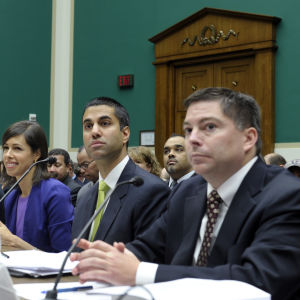Two Federal Communications Commissioners urging Congress to cap the budget on the recently expanded “Obama phone” program slammed the wireless industry this week for lobbying against a cap commissioners say will limit their profits.
“[I]t is extremely disturbing to learn that the association representing America’s wireless carriers is now opposing the imposition of any spending limitation on the Lifeline program,” FCC Commissioners Ajit Pai and Michael O’Rielly wrote in a letter to Oregon Republican Rep. Greg Walden, who chairs the House subcommittee that oversees the FCC.
The letter, timed to coincide with a Communications and Technology Subcommittee hearing to discuss legislation to cap the program, implores the committee to be skeptical of testimony by the representative of a wireless trade group.
“This is an interesting position as a number of wireless carriers are either directly or indirectly responsible for some of the waste, fraud and abuse existing in the Lifeline program,” the commissioners wrote.
“It is not surprising that these carriers seek and enjoy federal government subsidies, but it seems that they are ignoring the financial impact on those Americans — and their subscribers — who are not program recipients, especially those who live on incomes just above program eligibility, and will see their wireless bills increase substantially.”
The FCC voted along partisan lines last month to expand the Lifeline program to include broadband, while at the same time upping the program’s budget to an uncapped $2.25 billion from its current $1.6 billion. According to Republicans Pai and O’Rielly, who dissented after a compromise with one of the commission’s Democrats fell through, the bigger budget will cost Americans who pay their monthly phone and Internet bills more via fees to support Lifeline.
Carriers in the past have used to program to enroll the same subscribers multiple times for profit, while failing to adequately vet enrollees to ensure they meet the requirements and haven’t enrolled with other providers.
Earlier this month, the FCC announced a $51 million fine against a wireless carrier for defrauding the program out of an estimated $9.7 million for over-riding a system meant to prevent multiple enrollments.
A rapid rise of fraud pushed the program’s budget up over $2 billion in 2012 before reforms were put in place.
“Capping the Lifeline program may be counterproductive to encouraging low-income consumers to adopt communications services that are essential to participation in today’s economy,” Scott Bergmann, vice president of regulatory affairs for CTIA, which represents AT&T, Verizon, Sprint, T-Mobile and others, told the committee Wednesday.
“A cap on the Lifeline program will inherently exclude an undetermined number of the eligible low-income consumers,” he added.
Seeking to circumvent the taxpayer argument, Bergmann suggested the government fund Lifeline with a “general revenues model and the appropriations process” instead of monthly fees on consumers’ bills.
The cap proposed via legislation by Georgia Republican Rep. Austin Scott would cap the budget at $1.5 billion.
“Until there are better, more effective guardrails in place there’s nothing to prevent the FCC from spending and spending and spending, placing an even greater burden on American household budgets that have to assume those costs,” Walden said Wednesday.
Under the proposal enacted by the FCC, commissioners would be notified when program spending reaches 90 percent of its threshold and have six months to take action after determining the cause.
“The FCC can basically blow right through its ‘budget’ by as much as it desires,” Walden said. “I don’t think this is the way government should be handling the American people’s dollars, with cavalier disregard for basic fiscal discipline.”
Democrats on the committee pushed back against Republican criticism, arguing Americans — including school students — are in more need than ever of Internet at home, with one suggesting a hard cap may actually incentivize more to apply for the subsidy in fear of the well running dry.
Kentucky Democratic Rep. Rep. John Yarmouth described the legislation as “cold hearted,” while New Jersey Democratic Rep. Frank Pallone said it would “rip phones out of the hands of millions of Americans.”
“[T]he bill to curb the Lifeline program would take essential lifesaving devices away from the people who need help the most,” Pallone said, adding without it, many Americans would be deprived of the ability to even dial 9-1-1.
“If Republicans truly want to control the costs in the Lifeline program, their blunt force bill is the wrong approach,” he said.

